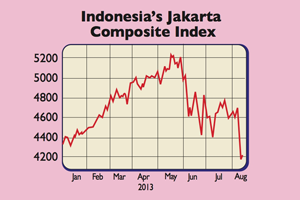
Emerging markets slumped this week. Indonesia’s stock market lost almost 10% in two days. Its currency, the rupiah, has hit a four-year low against the dollar. Thailand’s SET stock index slid by over 3% on Monday as the economy fell into recession. India’s currency, the rupee, fell to a record low against the greenback. Brazil’s real has also fallen sharply this month.
What the commentators said
“Emerging markets are all about timing and mood,” as Lex pointed out in the Financial Times. Since the 2008 crisis, there has been plenty of money sloshing around the international system, and investors have been impressed with strong emerging-economy growth rates and the promise of a similar pace of growth in the future. But now “the pendulum is swinging back in favour of the advanced countries”, said Shane Oliver of AMP Capital Investors.
The prospect of tighter money, and eventually higher interest rates, in America as the Fed begins to ease up on its money-printing programme, makes risky emerging assets less appealing to yield-hungry investors. So, money has flowed out of developing markets. At the same time, emerging-market growth has ebbed. Indeed, said Ian King in The Times, for the first time since 2007, the developed nations will contribute more to global GDP growth this year than China, India and Brazil together.
Emerging markets cannot decouple from the developed world, where growth has been seriously sub-par in recent years, said John Plender in the FT, and “they cannot decouple from China either”. As China tries to end its reliance on investment and thus steps down a gear, other manufacturers and commodity importers have struggled.
Growth and liquidity conceal a multitude of sins. Now that both have fallen, investors are noticing that there hasn’t been as much progress on structural reforms as they would like, and they are also fretting about vulnerabilities that they were happy to ignore in good times.
Enter Indonesia and India with their gaping current-account deficits. This means they rely on foreign money to make ends meet – and the danger is that much of it will leave now that the tide is going out for emerging assets. Five years after the global crisis rocked the rich world, it may now be emerging markets’ turn, reckoned Stephen Jen of SLJ Macro Partners. “This could get serious.”